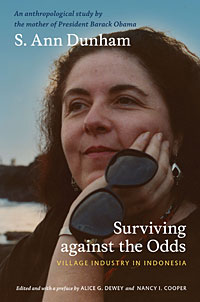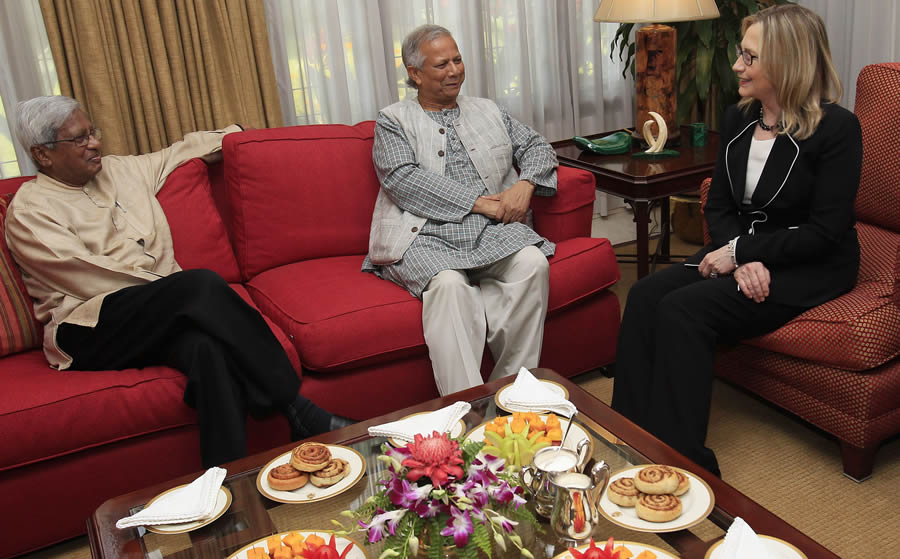Nothing about the fraudulent machinery in government can be described in a headline or in 140 characters and that is especially true when it comes to the Clinton’s and that pesky State Department.
This could read like a Hillary-wood script but it does have some familiar fingerprints as well from those of Barack Obama’s mother, Ann Dunham.

At a confirmation hearing before the United States Senate Foreign Relations Committee, US Secretary of State designate Hilary Clinton, while speaking briefly about President-elect Barack Obama’s mother, Stanley Ann Dunham, implied that microfinance would be an important part of the Obama administration’s agenda. Senator Clinton noted that Ann Dunham had worked on microfinance in Indonesia and that she had been scheduled to attend a microfinance forum at a United Nations conference in Beijing in 1995, which Ms. Clinton attended. Ms. Dunham, however, could not make it to the conference as she was diagnosed with cancer that eventually claimed her life few months after the conference. MicroCapital recently reported on Ann Dunham’s work as a researcher and practitioner of microfinance in Indonesia and her philosophy on the empowerment of women as a means to address poverty. Hilary Clinton also expressed similar sentiments at the hearing where she stated how, through her work on microfinance around the world, she had ‘seen firsthand how small loans given to poor women to start small businesses can raise standards of living and transform local economies’. Much more from MicroCapital.
Disgraced Clinton Donor Got $13M in State Dept. Grants Under Hillary
Hillary Clinton’s Department of State awarded at least $13 million in grants, contracts and loans to her longtime friend and Clinton Foundation donor Muhammad Yunus, despite his being ousted in 2011 as managing director of the Bangladesh-based Grameen Bank amid charges of corruption, according to an investigation by The Daily Caller News Foundation.
The tax funds were given to Yunus through 18 separate U.S. Agency for International Development (USAID) award transactions listed by the federal contracting site USAspending.gov. Much more here.
U.S. Doesn’t Track if Millions in Biz “Loans” to Refugees on Public Assistance Are Repaid
The U.S. government gives refugees on public assistance special “loans” of up to $15,000 to start a business but fails to keep track of defaults that could translate into huge losses for American taxpayers, records obtained by Judicial Watch reveal. The cash is distributed through a program called Microenterprise Development run by the Department of Health and Human Services (HHS) Office of Refugee Resettlement.
Since 2010 the program has granted thousands of loans to refugees that lack the financial resources, credit history or personal assets to qualify for business loans from commercial banks. Most if not all the recipients already get assistance or subsidies from the government, according to the qualification guidelines set by the Microenterprise Development Program. It’s a risky operation that blindly gives public funds to poor foreign nationals with no roots in the U.S. and there’s no follow up to assure the cash is paid back. The idea behind it is to “equip refugees with the skills they need to become successful entrepreneurs” by helping them expand or maintain their own business and become financially independent.
Earlier this year, Judicial Watch submitted a Freedom of Information Act (FOIA) request to HHS for records related to the refugee business loan program. Specifically, JW asked for the number of loans that are written off per year and the amount of the write-off per defaulted loan. Unlike commercial banks or other lending institutions, HHS doesn’t keep track of default rates on loans issued through the Microenterprise program. This is astonishing considering that these are taxpayer dollars being furnished in the form of loans to foreign nationals granted refuge in the United States. An HHS official told JW the agency doesn’t have a tracking system in place to provide figures involving loan defaults. However, the agency is “preparing to collect this information in the future,” according to the records obtained by JW from the agency.
What we do know is that from 2010 to 2015, HHS gave a total of 3,096 of these so-called micro loans, the records show. In 2015 a record 558 loans were granted to refuges but it’s not clear for what amount. At the high end, if all 558 loans made last year were for the full $15,000 available to each refugee that would mean that HHS can’t account for an astounding $8.37 million. Here’s the rest of the breakdown, according to the records furnished by HHS as a result of JW’s FOIA request; in 2010 the agency granted 550 micro loans; in 2011, 541; 2012, 437; 2013, 466; 2014, 544. That’s a big chunk of change. The last year HHS filed an official annual report on this questionable cash giveaway was 2011. No official records have been made available to the public since then, which is why JW launched an investigation. According to the 2011 annual report, which resembles a promotional brochure, the default rate is only 3% but no further details or breakdown is offered making the information less than credible.
HHS is not the only government agency doling out huge sums of cash for this cause, though its focus on refugees appears to be unique. Others, such as the U.S. Agency of International Development (USAID), the U.S. Department of Agriculture (USDA) and the Department of Labor (DOL) also dedicate hundreds of millions of dollars to various microenterprise causes. For instance, in one recent year alone USAID spent $223 million on microenterprise development activities, according to figures released by the agency. The USDA also allocates large sums to provide loans and grants to microenterprise development through a special “Rural Microloan Revolving Fund”and the DOL regularly pours lots of money into various microenterprise projects that are promoted as workforce investments in areas with high rates of poverty.
But hold on….there is more and there is some tracking, well maybe. FieldUs
Then comes the Office of Refugee Resettlement and the ‘microenterprise’ grants and loans. Just a sampling below from FY 2015.
Microenterprise Development Grants
Fiscal Year 2014/2015
| GRANTEE NAME | CITY | STATE | END DATE | AMOUNT | CONTACT |
|---|---|---|---|---|---|
| Anew America Community Corporation | Berkeley | CA | 9/29/17 | $200,000 | Viola Gonzales 1918 University Avenue, Suite 3A Berkeley, CA 94704-1051 510-540-7785 x301 |
| Pacific Asian Consortium | Los Angeles | CA | 9/29/16 | $215,000 | Namoch Sokhom 1055 Wilshire Blvd. 900B, Los Angeles, CA 90017 213-989-3265 |
| Opening Doors, Inc. | Sacramento | CA | 9/29/16 | $190,000 | Debra Debonot 1111 Howe Avenue, Suite 125, Sacramento, CA 95825 916-492-2591 |
| Community Enterprise Development Center | Denver | CO | 9/29/16 | $250,000 | Sisay Teklu 1600 Downing Street, #750, Denver, CO 80218-1412 303-569-8165 |
| Mountain States Group | Boise | ID | 9/29/17 | $125,000 | Ron Berning 1607 W. Jefferson St., Boise, ID 83702 208-336-5533 x230 |
| Jewish Family & Career Services | Louisville | KY | 9/29/16 | $174,008 | Judy Freundlich 2821 Klempner Way, Loiusville, KY 40205 502-452-6341 x224 |
| Coastal Enterprise, Inc. | Portland | ME | 9/29/17 | $125,000 | John E. Scribner 2 Portland Fish Pier, Suite 206, Portland, ME 04101 207-535-2915 |
| Massachusetts Office of Refugee & Immigrants | Boston | MA | 9/29/17 | $250,000 | Scott W. Levin 600 Washington Street, 4th Floor, Boston, MA 02111-1704 617-727-7888 |
| Arab community Center for Econ. & Social Services | Dearborn | MI | 9/29/17 | $207,733 | Sonia Harb 2651 Sauline Court, Dearborn, MI 48120 313-945-8139 |
| Hmong American Partnership | St. Paul | MN | 9/29/17 | $230,000 | Boa Vang 1075 Arcade Street, St. Paul, MN 55106-3213 651-495-1507 |
| International Institute of Metropolitan St. Louis | St. Louis | MO | 9/29/16 | $245,998 | Suzanne Lelaurin 3654 S. Grand, St. Louis, MO 63118 314-773-9090 x150 |
| Community Center for New Americans | New York | NY | 9/29/16 | $250,000 | Yanki Tshering 120 Broadway, Suite 230, New York, NY10271-002 212-898-4112 |
| International Rescue Committee | New York | NY | 9/29/17 | $220,000 | Jennifer Sime 122 East 42nd Street, New York, NY 10168 212-551-2924 |
| International Rescue Committee | New York | NY | 9/29/16 | $175,000 | Jennifer Sime 122 East 42nd Street, New York, NY 10168 212-551-2924 |
| The University of North Carolina at Greensboro | Greensboro | NC | 9/29/17 | $216,267 | Valera Francis 1111 Spring Garden Street, Greensboro, NC 27412-5013 336-334-5878 |
| Women’s Economic Self-Sufficiency team | Alburquerque | NM | 9/29/16 | $200,000 | Agnes Noonan 609 Broadway, NE, Alburquerque, NM 87102-2334 505-292-6666 |
| Economic and Community Development Institute | Colombus | OH | 9/29/16 | $250,000 | D. Craven 1655 Old Leonard Avenue, Columbus, OH 43219 614-559-0106 |
| Women’s Opportunities Resource Center | Philadelphia | PA | 9/29/17 | $195,000 | Hadi White 210 Chestnut Street, Philadelphia, PA 19103 215-564-5500 |
| ECDC Enterprise Development Group | Arlington | VA | 9/29/16 | $250,000 | Kevin Kelley 901 S. Highland Street, Arlington, VA 22204 703-685-0510 x225 |
| Diocese of Olympia | Seattle | WA | 9/29/17 | $225,000 | Greg Hope 1610 South King Street, Seattle, WA 98144 206-323-3152 |
| SNAP Financial Services | Spokane | WA | 9/29/16 | $216,189 | Kerri Rodkey 3102 W Fort George Wright Drive, Spokane, WA 99224-5203 509-456-7106 x112 |



